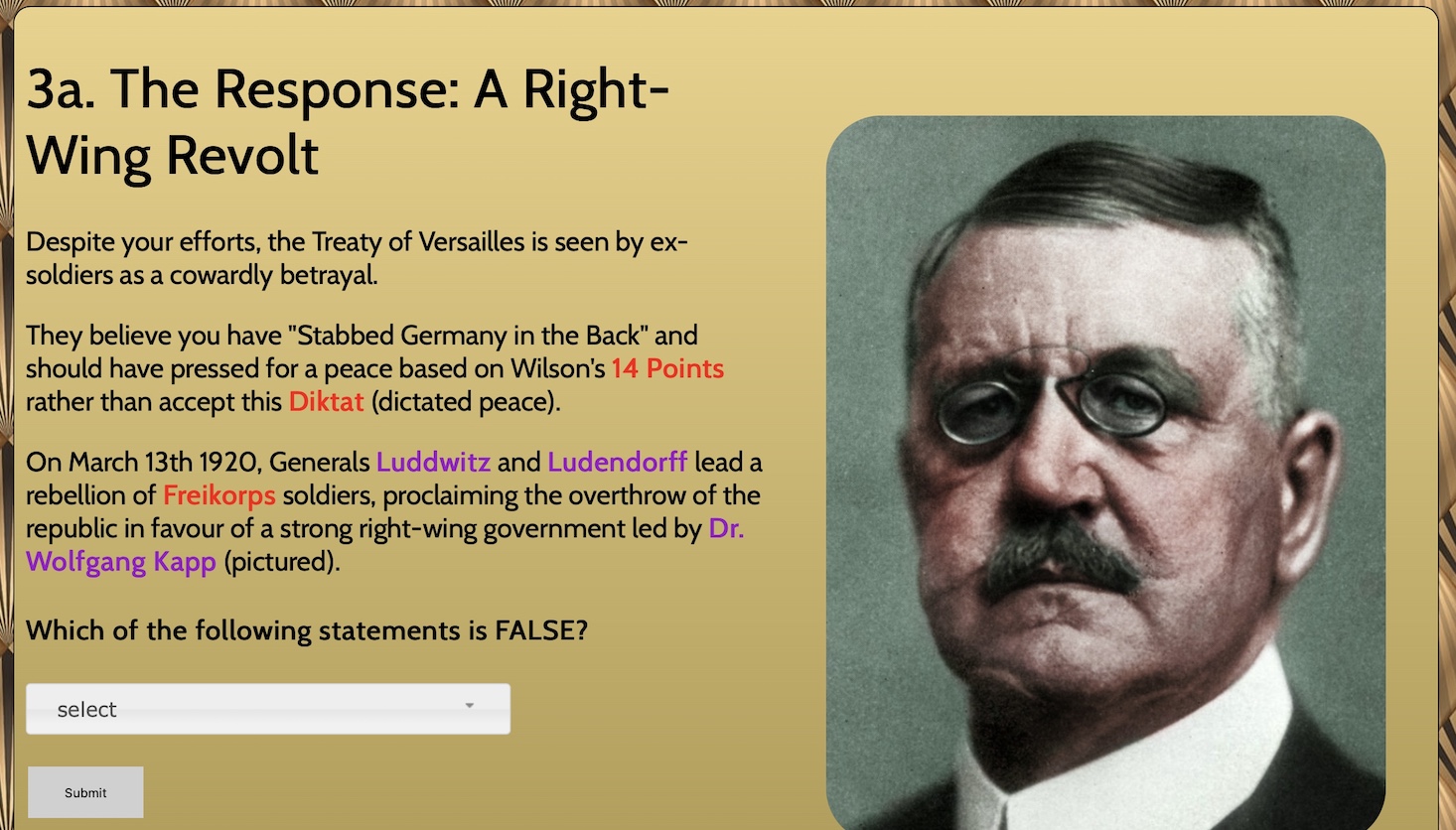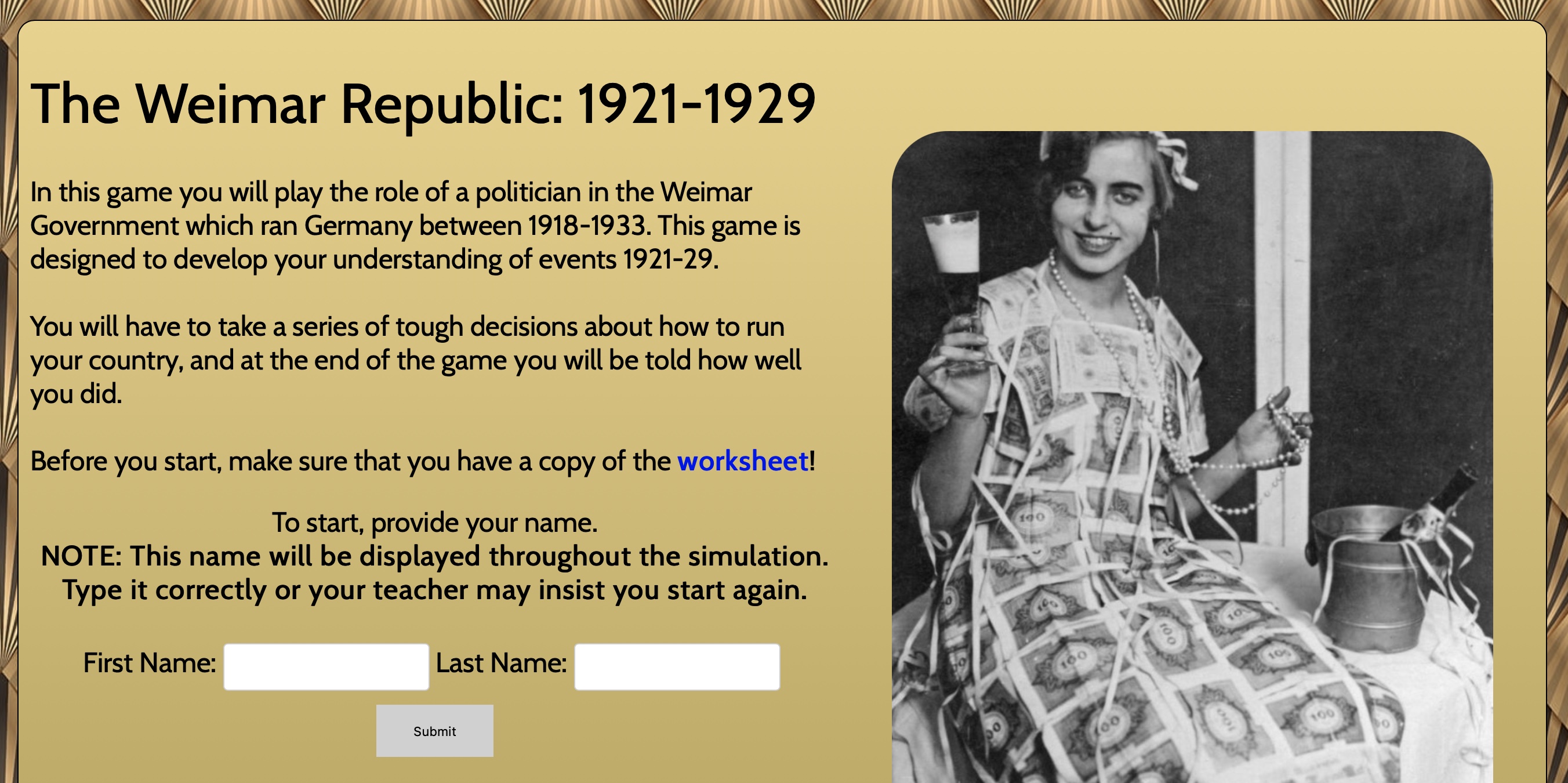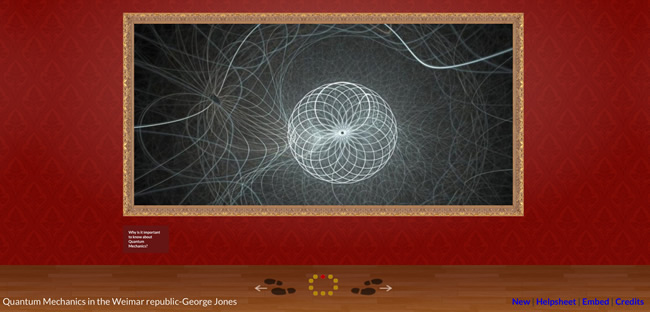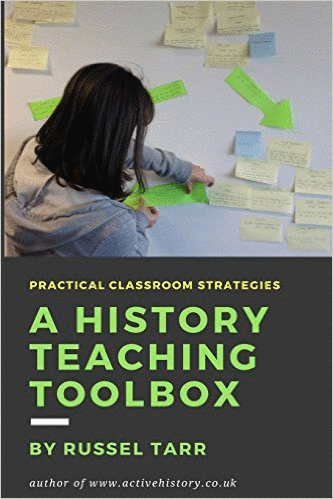World History teaching resources for the high school classroom: lesson plans, worksheets, quizzes and simulation games for KS3, IGCSE, IB and A-Level teachers.
Games, Lesson Plans and Worksheets - A self-contained study unit rounded off with the "Mr. Men" joint project with primary students.
Sourcework Assignment Pack
A comprehensive pack of sources and questions in the style of GCSE/IGCSE examinations, designed to be printed off at the beginning of the unit and used as homework exercises over the course of several weeks.
Weimar Germany Decision-Making Game - Part 1: 1918-21
Each of the 5 key decision points covers a different issue. By working through the activity and completing the worksheet, students will learn about the diplomatic, economic, social and political problems faced by the Republic, and consider how successfully the Republic dealt with them
Political Parties in Weimar Germany: Display Task
Useful as an extension or as a homework activity. Students are provided with a diagram of the main political parties in Weimar Germany. They use this as the basis for some propaganda posters for classroom display.
Revolts and Rebellions in the Weimar Republic
The teacher should follow up the computer simulation by going through the worksheet with the students carefully. This PowerPoint Presentation by Richard Fitzsimmons is particularly useful to elaborate on the revolts and rebellions of the period. The second half of the video documentary "Make Germany Pay" is also good to watch at this point if you have it.
Weimar Germany Decision Making Game - Part 2: 1921-29 complete with follow-up factual test.
This simulation is a great way of introducing or revising the issues surrounding Weimar Germany in the years 1921-29. Each of the 7 key decision points covers a different issue. By working through the activity and completing the worksheet, students will learn about the diplomatic, economic, social and political problems faced by the Republic, and consider how successfully the Republic dealt with them. The game is designed to "run itself" with minimal teacher preparation. After completing the game, students should be given this factual test, the answers for which can be obtained using an online presentation (the link to which is in the factual test document).
The Hyperinflation Crisis of 1923
Time should be spent going through the worksheet accompanying the computer simulation once the students have finished it. This PowerPoint presentation is particularly good on the subject of the 1923 crises. I also recommend getting hold of some hyperinflation banknotes, which are cheaply available on Ebay - this photo shows my own collection (I've also bought a Dawes Plan bond, and some Weimar Government bonds!)

Can you save the Weimar Republic? - Decision Making Game (shorter game, but still covering 1918-33)
This game should be used instead of the more comprehensive games listed above if time is limited.
Factual Test: The Weimar Republic 1918-33
After students have completed both parts of the computer simulation, their factual recall can be measured using this 25-question test.
The Culture of the Weimar Republic
The positive achievements of the Weimar Republic are easily overlooked. This project encourages students to investigate the cultural vibrancy of the Republic by producing a "virtual tour" around the Berlin of the 1920s. A Fling the Teacher quiz based on it is here. In the past I have also got students to design a mini-exhibition about the Weimar Republic, which is the subject of this blogpost.
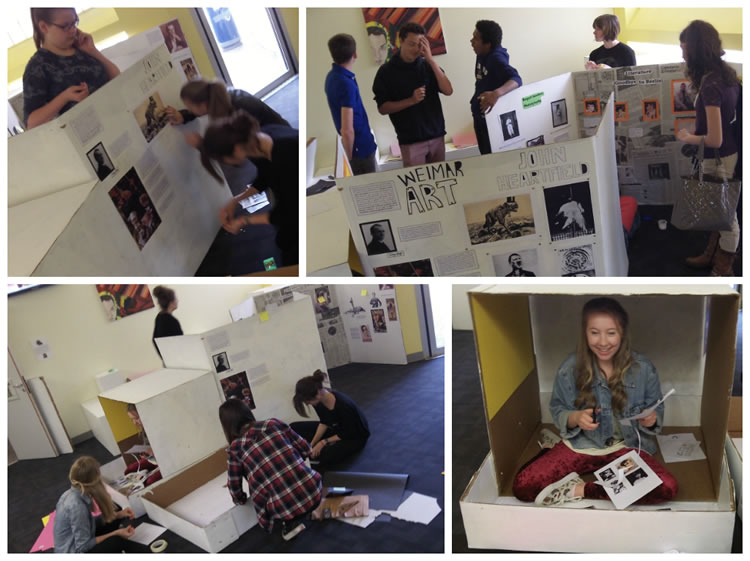
The Culture of the Weimar Republic: 3D Gallery Project
Using the 3D Gallery Generator at www.classtools.net, I allocate out different themes to different students. They research one in depth and decide how best to present it as a virtual gallery with 10 exhibits. Here are some samples:
Weimar Music by Freddie | The Architecture of Taut by Kate | Quantum Mechanics by George
Create your own 3D Gallery at www.classtools.net
The Culture of the Weimar Republic: Lotus Diagram template | Completed teacher version
As an alternative to creating a 3D Gallery, students can instead complete a Lotus Diagram Template.
The Fatal Attraction of Adolf Hitler: Worksheet
At this point, students should turn their attention in more detail to the activities of Adolf Hitler during the Weimar period. This worksheet is designed to accompany the first part of the excellent video documentary "The Fatal Attraction of Adolf Hitler (1989)" (30 mins). Sadly I don't think it's available for sale...
The Rise of Hitler - Complete Lesson Pack
This self-contained workpack is designed to keep students busy for 2-3 hours. It investigates Hitler's rise methodically by examining the period before the Munich Putsch, then the period 1924-28, then the period following the Wall St. Crash. For each, key explanations for Hitler's rise are identified and examined. I use this as the basis for a coursework assignment, and it is suitably thorough yet accessible!
Why did Hitler become Chancellor of Germany? - 1. Skeleton Essay Exercise
In this exercise, students are given three "skeleton essays", each one of which puts forward a different interpretation of Hitler's rise to power. Students read through each interpretation, choose the one they agree with most, and then elaborate on each section using their classroom notes. It provides an accessible way of showing students how the same evidence and factors can be linked in different ways.
Why did Hitler become Chancellor of Germany? - 2. Thinking Skills Exercise
Follows on from the previous worksheet. Students turn their essay into a flowchart highlighting the essential links between the factors and the most important factual information that can be used to substantiate each factor.
Why did Hitler become Chancellor of Germany? - 3. Display Task
The final part of the exercise involves students approaching the question from a completely fresh perspective. Six - rather than three - factors are provided in the form of cards, each one of which contains essential pieces of factual information. Students have to arrange these on sugar paper, establish links between the factors by connecting them with arrows, eliminate those they think are least important, and then writing up their findings as an essay.
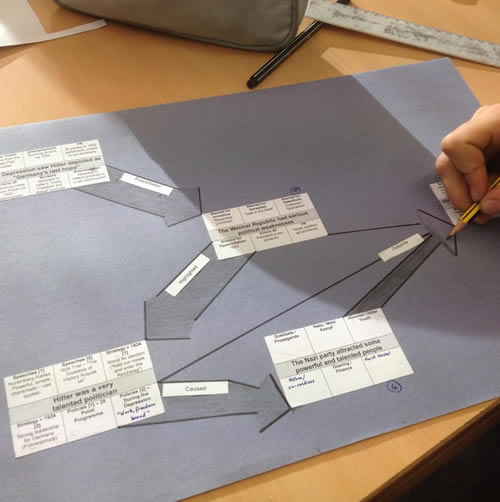
SOLO Hexagons: The Rise of Hitler
40+ factors are provided to students to organise into meaningful and connected categories as part of the essay-planning process. Full details of the hexagons approach can be found at Tarr's Toolbox.
Historiography: Historians on the Rise of Hitler
A series of quotes and extracts designed to be cut out and added into the hexagons diagrams outlined above.
The Rise of Hitler - Images
This double-sided sheet of selected images relating to the rise of Hitler can be used to develop the hexagons display piece still further, or as the basis for a visual essay writing exercise.
The Rise of Hitler - End of Unit Factual Test
To evaluate factual recall, students can then be set this test (30 questions) as a classroom exercise. Personally, I like to get them all playing this Fling the Teacher Quiz for the first 15 minutes of the lesson as "last minute revision". The first person to finish this game successfully gets 10/10, the second person gets 9/10 and so on. Then, they move on to the paper quiz so that by the end of the lesson the teacher has two marks in the markbook for each student!
Hitler: The Rise of Evil - Worksheet to accompany the drama documentary
A complete breakdown of the themes covered across the two episodes starring Robert Carlyle, designed to help teachers decide which bits should be shown in class and to help students structure their notes. The DVD can be purchased through Amazon here.
Interactive Essay Planning Tool: The Rise of Hitler [FREE!]
Professor AJP Sailor takes 5 factors and connects them together in endless combinations to help students consider the Origins of Spanish Civil War and how to link factors in essays.
Essay Keyword Checker: Why did Hitler become Chancellor of Germany?
This tool allows students to check the first draft of their essay to determine how many keywords have been included within it. As such it's a useful way of ensuring that the essential background knowledge has been worked into the essay.
Podcast: Was the Weimar Republic doomed from the outset?
Covers such things as:
- How did Germany emerge from defeat at the end of the First World War?
- What was the impact of the Treaty of Versailles on the Republic?
- How far was the Weimar Constitution a source of weakness?
- Why was proportional representation a weakness of the Weimar Constitution?
- Why was Article 48 a weakness of the Weimar constitution?
- Political disorder, 1919-23:
- Left-wing > What did the Spartacists want to achieve?
- Right-wing > Describe what happened in the Kapp Putsch.
- Why did France and Belgium occupy the Ruhr?
- Results of the Ruhr invasion
- Economic crises and hyper-inflation
- Hitler and the Munich Putsch
- To what extent did the Republic recover in the Streseman Era, 1923-1928?
- Economic successes / failures
- Foreign policy successes / failures
- Cultural successes / failures
Interactive Quizzes / Revision Tests
The Weimar Republic: End of unit self-marking factual test
This is a great way to test knowledge at the end of the topic. Each student in the class is given 30 randomly selected questions from a database in mutliple-choice format. At the end of the exercise, the teacher can access all the scores at once to put into the markbook.
"Who Am I?" Challenge - Weimar Germany
Each team will be presented with a clue about a key historical figure. They get 50 points if they guess it correctly. If they wish to 'pass', they get further (easier) clues but the points available steadily decline. An incorrect guess at any point means they get zero points for that round. You can play as many rounds as you wish. It's a great way to revise!
Telescopic Topic: The Weimar Republic
A collapsible online revision list covering all the main aspects of the topic. A great revision tool.
Interactive Cartoon Analysis
The Weimar Republic
Analyse a series of cartoons by hovering over details and answering exam-style questions. When you have finished, the computer will provide you with a printout comparing your answer to a model answer. A great way to revise and develop sourcework skills.
Interactive Quizzes
Fling the Teacher Quiz - Weimar Germany
"Hot Potatoes" Self-Marking Quizzes
a. Weimar Germany Cloze Exercises
b. Weimar Germany Multiple Choice Quiz
I also teach this topic at A-Level - click here to check out these resources.

© 1998-2025 Russel Tarr, ActiveHistory.co.uk Limited (Reg. 6111680)
1 Torrin Drive, Shrewsbury, Shropshire, SY3 6AW, England
Privacy Policy | Contact

